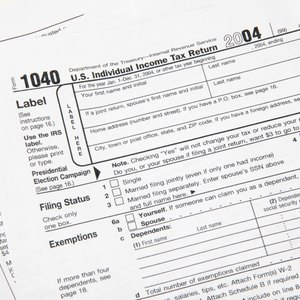
Income is only untaxed when you aren’t required to report it to the IRS. If you meet certain thresholds for income reporting requirements, then the IRS expects you to report the income and possibly pay taxes on it. These thresholds depend on whether the income is from self-employment or if you can be claimed on someone else’s return as a dependent. Knowing how much you can earn before being required to file a tax return ensures you remain in good standing with Uncle Sam. Even if you aren’t required to file, doing so is still a good idea – you could be due a refund.
Tips
The amount of money you can make before you need to pay taxes on it depends on your age, filing status and whether or not you can be claimed as a dependent on someone else's tax return.
Maximum Earnings Before Paying Tax
Each year the IRS releases new thresholds that determine whether you must file taxes on the income you’ve earned. These thresholds are adjusted for inflation and vary depending on your age and filing status. If you earn less than the amount designated for your filing status and age, then you are not required to file a tax return. However, if you want the refund of federal income tax withheld from your paycheck during the year or you want to take advantage of refundable tax credits you may be eligible for, you must file a return.
Here are the 2018 income thresholds you need to meet or exceed before you’re required to file taxes:
Single
- Age 65 and under – $12,000
- Age 65 and older – $13,600
Married Filing Jointly
- Both spouses under age 65 – $24,000
- One spouse age 65 and older – $25,300
- Both spouses age 65 years and older – $26,600
Married Filing Separately
- Any age – $5
Head of Household Status
- Age 65 and under – $18,000
- Age 65 and older – $19,600
Qualifying Widow/er
- Age 65 and under – $24,000
- Age 65 and over – $25,300
Earned Income Filing Requirements for Dependents
Dependents are people who can be claimed on another person’s tax return. Although someone else can claim a dependent, this does not mean that the dependent isn’t responsible for filing taxes on her income. The filing thresholds for dependents are typically lower than those for taxpayers who cannot be claimed on someone else’s tax return, and they are also adjusted annually for inflation. IRS Publication 929, Tax Rules for Children and Dependents, which is on the IRS website, details the filing requirements and rules for dependents. As of November 2018, this publication has not yet been updated to include dependent filing thresholds for the 2018 tax year, but you can expect an update before the filing season begins.
Self-Employed Filing Requirements
Self-employed and freelance taxpayers have the lowest income threshold before they must report their income to the IRS. If you earn more than $400 during the year, you have to file a tax return. This $400 1099 minimum amount applies across the board regardless of your age, dependency or filing status. You must report your self-employed earnings that exceed this amount to the IRS. Because the IRS has extensive rules and requirements for independent contractors, it is a good idea to consult with a tax adviser who can provide further guidance on self-employed filing requirements.
References
- IRS: Do I Need to File a Tax Return?
- IRS: About Publication 929, Tax Rules for Children and Dependents
- EFile.com: Does My Dependent Need to File a Tax Return?
- IRS: Self-Employed Individuals Tax Center
- Forbes: IRS Announces 2018 Tax Rates, Standard Deductions, Exemption Amounts And More
- Efile: Do You Have to File a 2018 Tax Return?
- Internal Revenue Service. "The Agency, its Mission and Statutory Authority." Accessed Jan. 26, 2020.
- Internal Revenue Service. "Publication 501: Dependents, Standard Deduction, and Filing Information," Page 2. Accessed Jan. 25, 2020.
- Internal Revenue Service. "Publication 501: Dependents, Standard Deduction, and Filing Information," Pages 2-9. Accessed Jan. 25, 2020.
- Internal Revenue Service. "Publication 501: Dependents, Standard Deduction, and Filing Information," Page 5. Accessed Jan. 25, 2020.
- Internal Revenue Service. "Individual Taxpayer Identification Number." Accessed Jan. 26, 2020.
- Internal Revenue Service. "Publication 501: Dependents, Standard Deduction, and Filing Information," Pages 2, 6. Accessed Jan. 25, 2020.
- Internal Revenue Service. "Publication 501: Dependents, Standard Deduction, and Filing Information," Pages 8-9. Accessed Jan. 25, 2020.
- Internal Revenue Service. "Publication 501: Dependents, Standard Deduction, and Filing Information," Page 6. Accessed Jan. 25, 2020.
- Internal Revenue Service. "Publication 501: Dependents, Standard Deduction, and Filing Information," Page 7. Accessed Jan. 25, 2020.
- Internal Revenue Service. "Publication 501: Dependents, Standard Deduction, and Filing Information," Page 9. Accessed Jan. 25, 2020.
- Internal Revenue Service. "Revenue Procedure 2018-57," Pages 8-9. Accessed Feb. 17, 2020.
- Internal Revenue Service. "IRS provides tax inflation adjustments for tax year 2019." Accessed Feb. 17, 2020.
- Internal Revenue Service. "Form 1040," Pages 1-2. Accessed Feb. 17, 2020.
- Internal Revenue Service. "About Form 1040." Accessed Jan. 26, 2020.
- Internal Revenue Service. "Schedule C: Profit or Loss From Business," Pages 1-2. Accessed Feb. 17, 2020.
- Internal Revenue Service. "About Schedule C (Form 1040), Profit or Loss from Business (Sole Proprietorship)." Accessed Jan. 26, 2020.
- Internal Revenue Service. "Instructions for Form 1065 (2019)," Pages 1-3. Accessed Jan. 26, 2020.
- Internal Revenue Service. "Instructions for Form 1120 (2018)," Pages 1-2. Accessed Jan. 26, 2020.
Writer Bio
Tara Thomas is a Los Angeles-based writer and avid world traveler. Her articles appear in various online publications, including Sapling, PocketSense, Zacks, Livestrong, Modern Mom and SF Gate. Thomas has a Bachelor of Science in marine biology from California State University, Long Beach and spent 10 years as a mortgage consultant.
